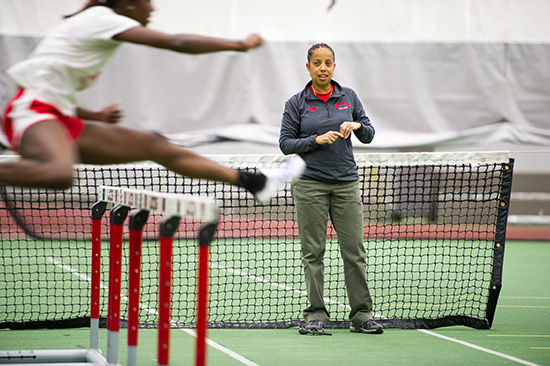BU Track and Field Director Heads to Olympics
Robyne Johnson is an assistant coach for Team USA

Robyne Johnson, BU’s track and field director, brings decades of coaching experience to her role as an assistant coach of the US women’s track and field team at the Summer Olympics in Rio. The track and field competition begins August 12. Photo by Cydney Scott
Robyne Johnson would have qualified for the 1992 US Olympic track team in the triple jump. Would have, because that event didn’t become an Olympic event until four years later, Johnson says; the ’92 trials were preparation for 1996. Her mother died in March that year, and Johnson’s zest to compete evaporated. And four years after that, then 38 years old, she tried, but failed to qualify for the 2000 games.
“It is what it is and sometimes you just kind of keep making the best of it,” Johnson, BU’s track and field director, says while relaxing recently in the Track & Tennis Center stands as student runners zip by like asteroids on the track during practice. After three decades of making the best of it by compiling a glittering career in coaching, she’s earned a prize of a different nature as one of four assistant coaches for the US women’s track and field Olympic team. She will coach the women’s jumps and combined events in Rio de Janeiro.
“I’d prefer to be in the Olympics as an athlete, but this is the next best thing,” she says. On reflection, she notes that she’ll be joining an even more elite group than competing Olympians: “There are fewer Olympic coaches than there are Olympians.”
And while mounting the medals podium ultimately depends on the athletes—“It is the Olympic Games; there are no chumps there”—she embraces her responsibility. “Everything we want to do in the United States is get people on that podium and get a medal,” she says. “And this could be their one and only chance. Sometimes, you never get to be an Olympian again. They should have no regrets about how the process went before that.
“I don’t want them to think, ‘Well, I didn’t get to the warm-up track early enough.’”
It’s a pressure cooker, to be sure; unlike collegiate competition, the Olympics are “all about your country and not just your team,” Johnson says. Yet she professes not to be nervous, thanks to a career that has prepared her for her moment in the Brazilian sun.
She has been an assistant coach for three US track and field teams in international competition—at the 1998 World Cup in South Africa (where the Americans won the title), the 2003 Pan American Games, and the 2012 DecaNation meet in France. She was also women’s head coach for Team USA at the 2011 World University Games in China. Photos and memorabilia from her athletic and coaching days plaster the walls of her small Track & Tennis Center office, including a ribbon from China covered with team pins from nations that competed there.
She knows everyone on Team USA’s track and field coaching staff, having worked with or competed against them in the past. (When she was a student sprinter, jumper, and hurdler at the University of Texas, she was coached by two people who’ve been Olympic head coaches.) As director of both BU men’s and women’s track and field, she overseas 102 students on six Division I teams in cross country, indoor, and outdoor competition.
“We could not be more proud of Robyne’s appointment,” says Drew Marrochello, BU athletics director. “She has enjoyed great success as both an athlete and a coach at nearly every level of track and field, which is arguably the premier sport of the Summer Olympics, and the respect she has earned is so well deserved.”
Johnson arrived in Rio last week—her first visit to the so-called Marvelous City—and she’ll stay until August 22 or 23. Her 12-year-old son will visit for a week to watch some of the games. (He’s on his parochial school’s track and field team, but is more partial to baseball, she says.) She racked up frequent flyer miles this summer with travels to the Olympic trials in Oregon and the 2016 games’ credentialing and training camp near Houston as she prepared for the main event.
Working with Olympians will be easier than her BU job in one respect: there’s only so much you can do to improve “the best athletes in the world,” she says.
Her speech to the athletes is, basically, “This is what works for you, it got you here, if you can do that again, you’re probably going to be on that medal stand.…Stay calm and allow your performance to come out. Don’t fight to get there.”
One of the advantages of working with other coaches at the Olympics, she says, is the opportunity to gain new perspectives on ways to communicate with athletes.
When you think Olympics, you might conjure epic moments: the upset US win at the 1980 men’s ice hockey semifinal sending them on to achieve gold or gymnast Kerri Strug’s vaulting and staying on her feet despite an injured ankle to win the 1996 gold. Asked to predict possible Rio moments, Johnson cites American Christian Taylor, who she thinks may break the men’s world and Olympic triple jump record.
“I expect there are going to be moments like that, when I’m going to be able to say, man, I was there to witness that.”
Comments & Discussion
Boston University moderates comments to facilitate an informed, substantive, civil conversation. Abusive, profane, self-promotional, misleading, incoherent or off-topic comments will be rejected. Moderators are staffed during regular business hours (EST) and can only accept comments written in English. Statistics or facts must include a citation or a link to the citation.